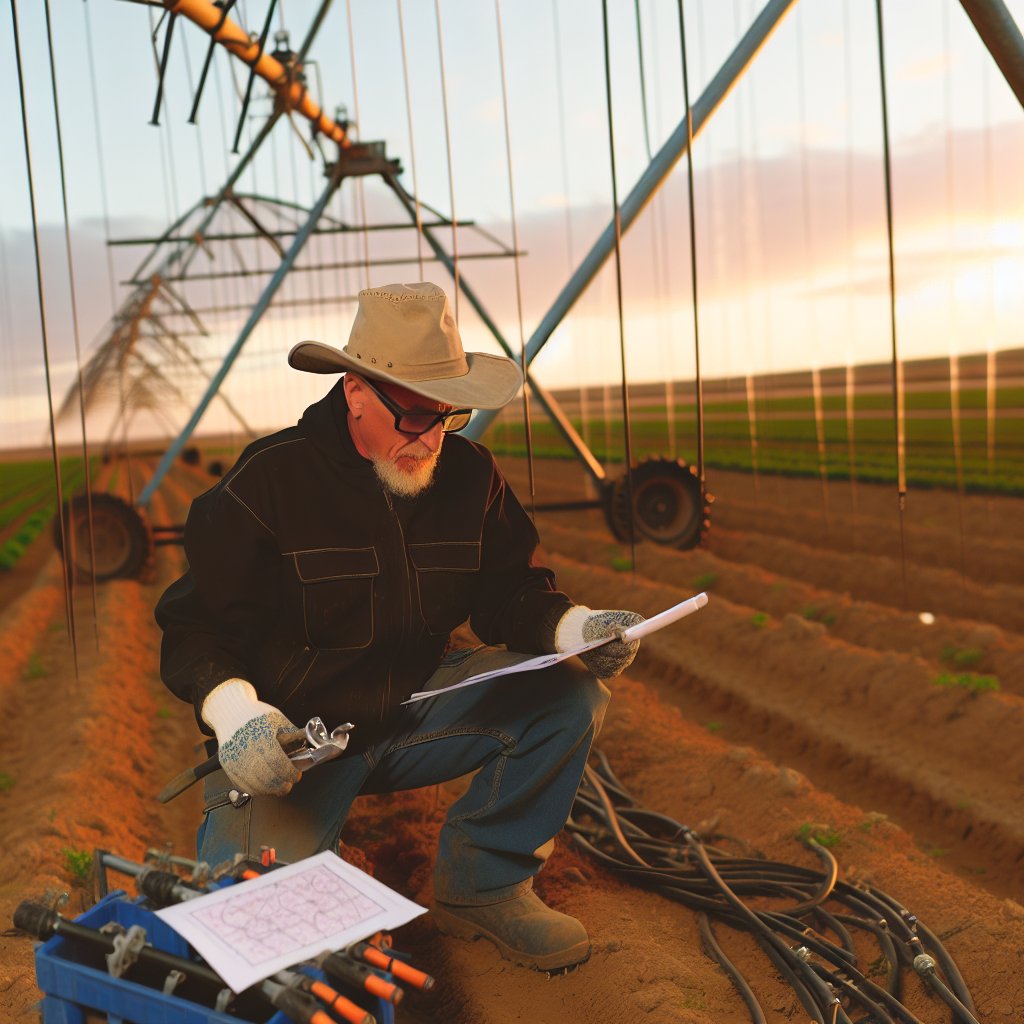Introduction:
Agricultural productivity and landscapes rely heavily on irrigation specialists.
The demand for irrigation specialists is steadily increasing in various industries.
Irrigation Specialist Role
An irrigation specialist plays a crucial role in designing, installing, and maintaining irrigation systems.
They are responsible for ensuring efficient water usage and distribution within the irrigation systems.
Irrigation specialists work in various environments such as farms, golf courses, and residential areas.
Responsibilities
Designing irrigation systems to meet the specific needs of the area.
Installing irrigation components such as pipes, valves, and sprinklers.
Conducting maintenance on irrigation systems to ensure they operate efficiently.
Monitoring water usage and making adjustments to improve distribution.
Troubleshooting and repairing any issues that arise with the irrigation system.
Collaborating with other professionals such as landscapers and agronomists to optimize water usage.
Working Environments
Farms: Irrigation specialists are essential in agriculture to ensure crops receive adequate water.
Golf courses: Maintaining lush greens and fairways requires precise irrigation systems.
Residential areas: Irrigation specialists help homeowners maintain healthy lawns and gardens.
Sports fields: Ensuring sports fields are properly irrigated is crucial for player safety and field quality.
Parks and public spaces: Irrigation systems are vital to keeping public spaces green and inviting.
The role of an irrigation specialist is vital in maintaining efficient water distribution in various environments.
Their expertise in designing, installing, and maintaining irrigation systems ensures that water is used effectively, benefiting both the environment and the community.
Education and Training Requirements:
Education and training requirements for irrigation specialists are essential for success in this field.
Let’s explore the qualifications needed to pursue a career as an irrigation specialist.
Transform Your Career Today
Unlock a personalized career strategy that drives real results. Get tailored advice and a roadmap designed just for you.
Start NowDegree in Horticulture, Agriculture, or Irrigation Technology:
One of the primary educational qualifications required to become an irrigation specialist is a degree in horticulture, agriculture, or irrigation technology.
These fields provide the necessary foundation of knowledge and skills needed to design, install, and maintain irrigation systems effectively.
Hands-On Training and Certifications:
Hands-on training is invaluable for irrigation specialists to develop practical skills in system design and maintenance.
Additionally, certifications in irrigation system design and maintenance demonstrate a commitment to professional development and can lead to career advancement opportunities.
Specialized Skills and Knowledge:
In specific industries, specialized skills and knowledge may be required for irrigation specialists.
For example, knowledge of drip irrigation systems is essential for maximizing water efficiency in agriculture.
Understanding soil science is also important for determining optimal irrigation schedules and techniques based on soil types.
Overall, a combination of formal education, hands-on training, and specialized knowledge is key to success as an irrigation specialist.
By acquiring the necessary qualifications and skills, individuals can excel in designing and maintaining efficient irrigation systems across various industries.
Find Out More: Best Practices for Livestock Artificial Insemination
Skills and Qualities:
Strong problem-solving abilities are crucial for an irrigation specialist to assess and resolve issues efficiently.
Attention to detail is essential to ensure proper installation and maintenance of irrigation systems.
Effective communication skills are important when interacting with clients and team members.
Customer service skills are vital in providing a positive experience for clients and maintaining relationships.
Physical requirements may include the ability to lift heavy equipment and work in outdoor environments.
Adaptability is key to handling unexpected challenges and changing weather conditions.
Time management skills are necessary to complete tasks efficiently and meet deadlines.
Transform Your Career Today
Unlock a personalized career strategy that drives real results. Get tailored advice and a roadmap designed just for you.
Start NowTechnical knowledge of irrigation systems and equipment is essential for effective problem-solving and installation.
Teamwork skills are important for collaborating with colleagues and coordinating projects effectively.
Organization skills help in maintaining records, scheduling appointments, and managing resources efficiently.
Gain More Insights: The Impact of Climate on Grape Cultivation
Duties and Responsibilities:
- Conduct site surveys to assess irrigation needs and determine system requirements.
- Design customized irrigation systems based on site layout, water source, and plant material.
- Troubleshoot and resolve issues with irrigation equipment, including leaks and malfunctions.
- Perform regular maintenance checks to ensure proper functioning of irrigation systems.
- Repair or replace faulty components to prevent water waste and optimize system performance.
- Educate clients on water conservation practices and the benefits of efficient irrigation systems.
- Promote sustainable irrigation methods, such as drip irrigation and rainwater harvesting.
- Collaborate with landscaping teams to integrate irrigation systems seamlessly into outdoor designs.
- Stay updated on industry trends and advancements in irrigation technology to improve services.
- Provide cost estimates for installation, maintenance, and repair services to clients.
As an irrigation specialist, your day-to-day tasks revolve around ensuring that plants receive adequate water while maximizing efficiency and minimizing waste.
This involves conducting thorough site surveys to assess the landscape and design customized irrigation systems that meet the specific needs of the area.
Regular maintenance checks are crucial to prevent potential issues and ensure the smooth operation of irrigation systems.
By promptly addressing leaks, clogs, or other malfunctions, you can prevent water waste and costly repairs down the line.
Moreover, part of your role involves educating clients on the importance of water conservation and sustainable irrigation practices.
By sharing your expertise and recommendations, you can help them make informed choices that benefit both their landscape and the environment.
Collaboration with landscaping teams is essential to seamlessly integrate irrigation systems into outdoor designs.
By working together, you can create cohesive and functional landscapes that thrive with the right amount of water.
Staying informed about industry trends and technological advancements is key to providing cutting-edge services to your clients.
By adopting new techniques and tools, you can enhance the efficiency and effectiveness of your irrigation systems.
By fulfilling these duties and responsibilities, you play a vital role in promoting sustainable practices and ensuring the health and beauty of landscapes through efficient irrigation solutions.
Uncover the Details: The Ethics of Insect Research: What You Need to Know
Work Environment
As an irrigation specialist, the typical work environment involves spending a significant amount of time outdoors, regardless of the weather conditions.
This means that you must be prepared to work in hot sun, pouring rain, or even freezing temperatures.
There is also a potential for travel to different job sites, as irrigation systems are installed in various locations such as residential properties, commercial buildings, parks, golf courses, and agricultural fields.
This requires flexibility in working hours and the ability to adapt to different environments.
Transform Your Career Today
Unlock a personalized career strategy that drives real results. Get tailored advice and a roadmap designed just for you.
Start NowPhysical Demands
- One of the physical demands of being an irrigation specialist is the need to lift heavy equipment such as pipes, valves, and pumps.
- This requires strength and stamina to handle the manual labor involved.
- Additionally, accessing irrigation systems may require bending or kneeling for extended periods of time.
- This can be taxing on the body, especially for those with existing back or knee issues.
- Working in outdoor environments also means exposure to elements like dust, dirt, pollen, and insects.
- Proper protective gear must be worn to ensure safety and prevent health hazards.
The work environment of an irrigation specialist is dynamic and challenging, but also rewarding for those who enjoy working in the great outdoors and have a passion for water management systems.
It is a physically demanding job that requires flexibility, adaptability, and a strong work ethic to succeed in this field.
You Might Also Like: How to Network in the Conservation Science Field

Salary and Job Outlook:
The average salary range for irrigation specialists varies based on experience and industry.
Entry-level specialists can expect to earn around $30,000 to $40,000 per year.
With experience and expertise, irrigation specialists can earn up to $70,000 or more annually.
Industries such as agriculture, landscaping, and golf course management offer higher salaries.
The job outlook for irrigation specialists is promising, with a projected growth rate of 8%.
The demand for professionals in this field is expected to increase due to climate change.
Opportunities for Advancement:
Irrigation specialists can advance their careers by specializing in specific types of irrigation systems.
Specializing in drip irrigation, sprinkler systems, or agricultural irrigation can lead to more opportunities.
Becoming a consultant for irrigation projects is another avenue for career advancement.
Consultants can work with residential or commercial clients to design efficient irrigation systems.
Advancing in this field can also lead to higher-paying positions and increased job satisfaction.
Safety and Regulations:
When it comes to the installation and maintenance of irrigation systems, following safety protocols and regulations is crucial.
Ignoring these guidelines can lead to accidents, injuries, and even legal consequences.
Importance of Following Safety Protocols:
- Prevents accidents and injuries for both the irrigation specialist and clients
- Ensures the longevity and efficiency of the irrigation system
- Compliance with safety standards minimizes liability risks
Industry Standards and Legal Requirements:
Irrigation specialists must adhere to various industry standards and legal requirements to operate ethically and legally.
Some of these include:
- Water usage restrictions set by local or state authorities
- Compliance with environmental regulations to protect natural resources
- Following building codes related to irrigation system installations
Need for Ongoing Training and Certification:
Continuous training and certification are essential for irrigation specialists to stay updated on best practices and emerging technologies in the field.
This ongoing education ensures that they provide high-quality service and adhere to industry standards.
Transform Your Career Today
Unlock a personalized career strategy that drives real results. Get tailored advice and a roadmap designed just for you.
Start Now- Keeps specialists informed about the latest irrigation trends and advancements
- Improves the specialist’s skills and expertise in system installation and maintenance
- Enhances credibility and trust with clients by showcasing knowledge and professionalism
Safety and regulations play a critical role in the work of irrigation specialists.
By following protocols, meeting legal requirements, and seeking continuous training, these professionals can ensure the safety, efficiency, and compliance of irrigation systems.
Essential Role of Irrigation Specialists
Irrigation specialists play a crucial role in various industries.
They maintain, design, and repair irrigation systems.
This ensures proper distribution of water.
They are essential for maximizing crop yield.
Preserving resources is another critical function.
Moreover, they promote sustainable practices.
Considering a career as an irrigation specialist can be rewarding.
This field offers opportunities for growth and impact.
Fields such as agriculture, landscaping, and environmental sectors benefit the most.
If you are interested in pursuing this field, numerous resources are available.
Research and training opportunities can help you get started.
Embrace this fulfilling career path for a significant impact.
Additional Resources
Careers | Farm Production and Conservation Business Center
Search Jobs – Montana State University Employment Opportunities
[E-Books for Sale]
The Big Book of 500 High-Paying Jobs in America: Unlock Your Earning Potential
$19.99 • 500 High-Paying Jobs • 330 pages
Explore 500 high-paying jobs in America and learn how to boost your career, earn more, and achieve success!
See All 500 High-Paying Jobs of this E-Book
1001 Professions Without a Degree: High-Paying American Jobs You Can Start Now
$19.99 • 1001 Professions Without a Degree • 174 pages
Discover 1001 high-paying jobs without a degree! Unlock career tips, skills, and success strategies for just $19.99!




